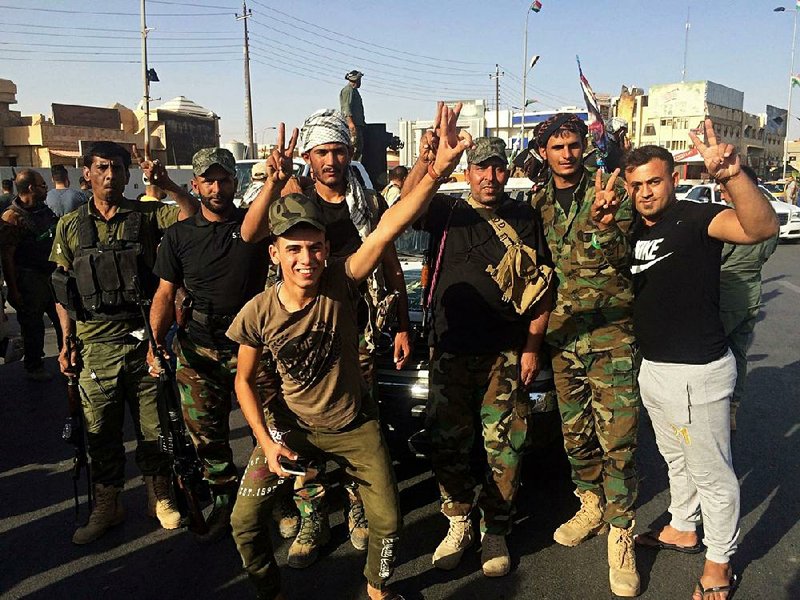KIRKUK, Iraq -- The Iraqi government began a military operation Monday to blunt the independence drive by the nation's Kurdish minority, wresting oil fields and a contested city from separatists pushing to break away from Iraq.
In clashes that pit two crucial U.S. allies against each other, government troops seized the vital city of Kirkuk and surrounding oil fields, ousting the Kurdish forces who had controlled the region for three years in their effort to build an independent nation in the northern third of Iraq.
The Kurds voted overwhelmingly in a referendum three weeks ago for independence from Iraq. The United States, Baghdad and most countries in the region condemned the vote, fearing it would fuel ethnic divisions across the region, lead to the breakup of Iraq and hobble the fight against the Islamic State.
Iraqi government troops and the Kurdish forces, known as peshmerga, are both essential elements of the U.S.-led coalition battling the Islamic State. Both forces are supplied and trained by the United States.
Kurdish officials accused the Iraqi army of carrying out a "major, multiprong attack," and reported heavy clashes on Kirkuk's outskirts, but a spokesman for Iraq's state-backed militias said they were met by little resistance.
Iraqi forces took the region without a fight and with few confirmed casualties after having brokered an agreement with the Kurdish faction that controlled Kirkuk.
As cheering crowds looked on, Iraqi forces removed a Kurdish flag that had flown over the Kirkuk governor's compound and left intact an Iraqi flag mounted beside it, local officials said. They said Iraqi troops were driving through the city, removing peshmerga flags and banners and replacing them with Iraqi flags.
Iraqi troops took over the provincial governor's compound, the military command in Baghdad said.
Revelers waving Iraq's national flag and the flag of its Turkmen minority flooded central Kirkuk in an evening celebration.
Iraqi forces were supported by the country's Popular Mobilization Forces, a predominantly Shiite militia coalition that the Kurds see as an instrument of Iranian policy.
In their bid to keep Kirkuk and its oil-rich countryside, Kurdish leaders whipped up fears that the central government in Baghdad is dominated by Tehran and would oppress Kurds if they recaptured the ethnically mixed city.
Their fears were bolstered after Iran came out forcefully against the referendum and then closed its official crossings to the region on Sunday.
As Arab and Turkmen revelers celebrated the change of power in Kirkuk, thousands of Kurdish residents, fearful of federal and militia rule, packed the roads north to Irbil, the capital of the autonomous region.
Military commanders in Baghdad said their troops had taken control of an industrial district on the western edge of Kirkuk, as well as a power plant and refinery adjacent to the oil fields outside the city. The military command also said government forces had secured control of a military airport west of the city.
The operation came as divisions within the Kurdish command broke into the open Monday, with officials from a Kurdish opposition party, the Patriotic Union of Kurdistan, saying that its fighters had agreed to make way for the advancing Iraqi forces even as other fighters loyal to the governing Kurdistan Democratic Party continued to resist.
The government forces moved in after peshmerga fighters for the opposition withdrew from Kirkuk under an agreement with the Iraqi military.
Officials in Baghdad said the provincial governor, Najmaldin Karim, had left Kirkuk for Irbil. Karim could not be reached for comment. He was dismissed by Baghdad earlier this year but remained in office because Kurdish fighters controlled the city.
In Irbil, the peshmerga general command said in a statement that Shiite militias had taken part in operations in Kirkuk province, calling it "a flagrant declaration of war against the nation of Kurdistan." The military command in Baghdad said there was an understanding that the Shiite militias would not enter Kirkuk.
A militia spokesman said the Popular Mobilization Forces had not entered central Kirkuk, but Associated Press reporters saw Turkmen Popular Mobilization Forces militiamen taking up posts in the western part of the city.
In a statement Monday afternoon, the U.S.-led coalition said the movements of government military vehicles were "coordinated movements, not attacks."
The statement said clashes early Monday were precipitated by "a misunderstanding" and were "not deliberate as two elements tried to link up under limited visibility conditions" at night.
The coalition is not supporting either side in the Kirkuk conflict, the coalition statement added. Dillon said all U.S. troops in the area were safe.
The Pentagon urged the central government and the Kurdish authorities to negotiate their differences.
A Pentagon spokesman, Col. Rob Manning, said the confrontation is a "distractor" to the U.S. goal of destroying the Islamic State group, and that Iraqi security forces and Kurdish peshmerga troops should not be "going at each other."
Turkey, which has a large Kurdish population and is fighting a Kurdish insurgency in its territory, said it supports the operation.
Speaking to reporters at the end of a Cabinet meeting Monday, Deputy Prime Minister Bekir Bozdag however, described the operation as "too late" in coming.
"There is an attack against Iraq's territorial integrity, against its sovereignty rights, its political unity and constitution," Bozdag said. "We think this step designed to expel this attack is a very important one."
He also announced that Turkey is closing its airspace to flights to and from Iraq's Kurdish region, and handing over the control of a border gate into the Kurdish region to the Iraqi central government.
Information for this article was contributed by David Zucchino of The New York Times; and by Balint Szlanko, Philip Issa and Emad Matti of The Associated Press.
A Section on 10/17/2017

